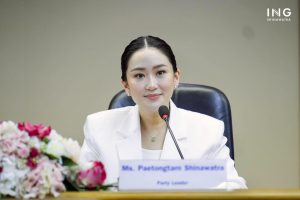Much like the rest of Asia, political dynasties have long been a fixture in Thai politics. Just look at the current cabinet lineup. The tourism and sports minister is the daughter of former deputy commerce minister. The natural resources and environment minister is the brother of Gen. Prawit Wongsuwan, leader of Palang Pracharath Party. The education minister, who doesn’t seem fit for the job given his background in law enforcement (and indeed, he faced criticism earlier this year for praising the discipline and patriotism of North Korea’s education system), is from the Chidchob family, one of the most enduring political clans in Thailand and the driving force behind Bhumjaithai Party. Cases like these are too numerous to count if we look back at predecessor Thai cabinets.
The introduction of a new elite military course by the National Defense College (NDC) has raised further concerns about “nepo babies” and Thailand’s deep-rooted patronage system.
The NDC is undisputedly Thailand’s most prestigious educational institution when it comes to security and strategic studies. It was first established in the 1950s by the nationalist – some would say fascist – Field Marshal Plaek Phibunsongkhram to socialize the country’s top military leaders, police officers, and civil servants. It was only towards the end of the Cold War that the NDC started incorporating the private sector, opening its arms to selected business owners and executives. Then, in 2003, the NDC began accepting politicians into its circle.
The latest course of concern, popularly dubbed “mini NDC” or formally known as “National Defence Course for Future Leaders,” represents a big break from the past. Whereas the previous courses had a minimum age requirement of 50 or above, the mini NDC welcomes students aged 35 to 42. Furthermore, the new course has significantly broadened its participant base to include influencers with large social media followings, especially those from “Generations Y, Z, and Alpha.” This includes media personalities, IT professionals, scholars, writers, and consultants.
Applications for the mini NDC program opened in December and in February of this year, the names of 150 successful candidates were unveiled. The list includes a plethora of familiar surnames, with many connected to prominent politicians who are currently in office. There is, for instance, the daughter of Deputy Prime Minister Somsak Thepsutin. Somsak, prior to his current post, has held ministerial portfolios a remarkable 14 times, under different party banners. Justice Minister Tawee Sodsong also has his son enrolled in the course.
But the name that has attracted the most buzz is, without doubt, Paetongtarn Shinawatra, the 37-year-old leader of the ruling Pheu Thai Party and the daughter of its spiritual leader, controversial former Prime Minister Thaksin Shinawatra.
Both Paetongtarn and her father Thaksin, who was released on parole from detention on February 18, have been dominating news cycles lately. Thaksin toured his old stronghold of Chiang Mai, made a grand entrance at the Pheu Thai headquarters in Bangkok, and was voted Thailand’s most influential politician (which isn’t necessarily a good thing). In the March poll, Thaksin gained almost 43 percent of the vote, surpassing the actual prime minister Srettha Thavisin by around 21 percent. Paetongtarn, meanwhile, was recently warmly welcomed by the Hun clan in Cambodia. And, despite her apparent lack of experience in the field of defense, she was appointed as one of the three “advisory experts” of the mini NDC program.
To be sure, the NDC is a valuable tool for national security, and the rationale behind its evolution makes logical sense. Back during the Cold War days, when traditional security concerns of foreign invasion and subversion from within were key, it was crucial to focus on synchronization between military and civilian leadership. As the Cold War melted away and Thailand shifted its priority to economic development, it was imperative to engage the private sector. Fast forward to the present, amidst the complex security landscape involving cybersecurity and artificial intelligence threats, the incorporation of younger, tech-savvy and probably more globalized generations has become increasingly important.
But the perpetually elitist nature of the NDC could lower its intellectual value. Against the backdrop of many peculiar political maneuvers and a questionable justice system – all put on display by Thaksin’s release, the NDC is often perceived by the general Thai public as little more than a playground where the wealthy and powerful – 1 percent of the society, as Srettha remarked last September – meet to forge connections mainly for their own self-serving agendas. Some people also view the NDC as a mechanism to contain political outcasts, such as the ultra-progressive Move Forward Party.
I am of the opinion that nepo babies who demonstrate competence in their roles should be welcomed. At the same time, it’s undeniable that their dominance could discourage wider political participation, potentially undermining any future efforts to develop bottom-up security initiatives reliant on broader public engagement.

































